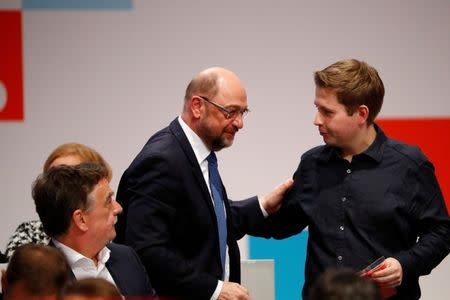Leader of German Social Democrats' youth wing could be Merkel's nemesis
By Madeline Chambers
BERLIN (Reuters) - On the face of it, a fresh-faced, hoodie-wearing 28-year-old is an unlikely threat to the leader of Germany's Social Democrats (SPD), let alone to conservative Chancellor Angela Merkel.
Yet before an SPD vote on Sunday on whether to enter formal talks with Merkel, the leader of the party's Jusos youth wing has struck a chord with members with his campaign against a re-run of the "grand coalition" that has ruled Germany since 2013.
"The chancellor is hanging on a Jusos drip," wrote the daily Die Welt this week, reflecting a flurry of headlines about Kevin Kuehnert, Jusos leader since November, as a potential nemesis for the upper middle-aged leaders of Germany's two main parties.
Three days before SPD delegates decide whether to enter formal coalition negotiations with Merkel's conservatives, Kuehnert, a Berliner, looked serious but relaxed.
"To keep returning to a grand coalition out of fear that everything else is even worse really diminishes the SPD in the long run," Kuehnert told reporters.
His style brings a breath of fresh air to the somewhat staid world of German politics. In an open-necked black shirt, jeans and trainers, Kuehnert stood in front of a microphone and spoke articulately without notes.
Despite the age difference, some German media have called him Germany's Jeremy Corbyn, the 68-year-old leftist leader of Britain's Labour party leader who has galvanised young supporters.
"OPTIMISTIC"
Kuehnert's clear message and congenial manner have resonated. SPD rank and file are split over the policy blueprint deal that would be the basis for talks with the conservatives.
"I am very optimistic that on Sunday, we have a real chance of winning the vote," Kuehnert told reporters at SPD headquarters, a venue he said he chose to emphasise solidarity with the party.
The stakes could barely be higher.
If delegates vote against the blueprint agreed with Merkel, SPD chairman Martin Schulz is widely expected to quit.
Moreover, Merkel would have failed twice at forming a coalition after a previous attempt with other parties collapsed in November, putting a big question mark over her own future. The result could be a minority government or new elections.
However, Kuehnert is at pains not to attack Schulz. "After Sunday, I won't be calling for anyone to resign," he said.
A soccer fan whose mother works in a jobs centre, Kuehnert sought to demolish the argument made by some in the SPD that it must avoid a new election due to its dismal ratings, by saying an election is not inevitable if there is no grand coalition.
In the September election, the SPD saw its support slump to 20.5 percent, its lowest since 1933 and underlining its loss of identity and profile in a coalition that was dominated by Merkel. Now opinion polls put it on at 18 percent.
Kuehnert is adamant that the SPD needs to go into opposition to reinvent itself. "We are looking for a path that will lead the SPD back to being the big left party again," he said.
Former Jusos leaders include ex-chancellor Gerhard Schroeder, whom Merkel defeated to start her first term in office back in 2005, and Andrea Nahles, who is tipped as a possible successor to Schulz.
(Reporting by Madeline Chambers; editing by Mark Heinrich)

 Yahoo News
Yahoo News 

